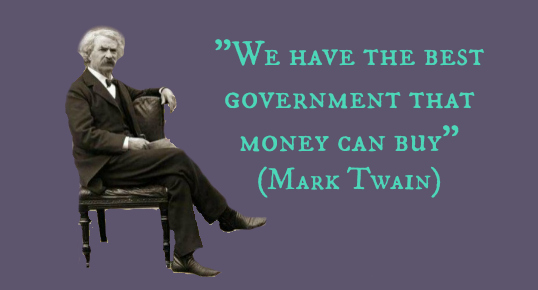The Politician’s Guide to Democracy: Part One (Five things Democracy IS NOT) #ItsTime
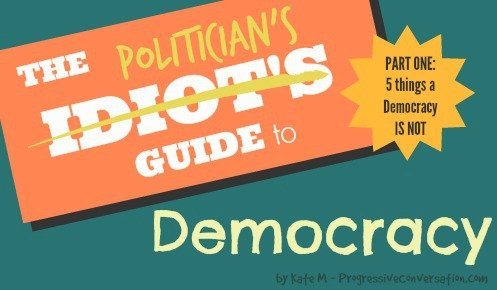
Are you a Politician who can’t get his own way? Have you put forward perfectly reasonable policies to the people of your country – only to hear the whiny cries of your ungrateful constituents? Are you trying to get some legislation through parliament, but find that those unreasonable Politicians in opposition won’t play ball? Are you sick of people ignoring your mandate to – well, do whatever the hell you please?
Well this is the Guide for you. It goes through the basics of what true democracy is and – more importantly for many of you – what democracy is not.
The good news is that despite many of your constituents’ lack of faith in you, it’s not all that hard. There’s nothing in these lessons that hasn’t been done before. In fact, there are actually Politicians out there today who have a good understanding of the contents of this Guide and can work fairly effectively in their democracies. So put your phones down, stop googling yourself and read on…
Part One: Five things a Democracy is NOT
We’re going to start your training by dispelling a few widely held myths about a Politician’s role in a Democracy. But before we get going, here’s a quick reminder of what US President Abraham Lincoln said Democracy is:
“Government of the people, by the people, for the people.“
Lesson One: You have a mandate to represent, not to rule
‘Mandate’ seems to be a favourite word for many Politicians. You like to use it to claim that you have the right to do all manner of things. And the truth is that when we elect you to parliament we actually do give you a mandate. But it’s a mandate to represent us – the people – not to rule over us.
You’re not monarchs, you’re not rulers – a democracy is not meant to be some sort of limited-term dictatorship where one person (or even a small group of people) gets to do whatever they want to a country for a few years.
A democracy is about equality, not hierarchy. We citizens vote in a group of people to represent us. Each of our votes is equal and each of the representatives we elect is equal on the floor of parliament. Or at least they should be. Further, in a democracy everyone has the right to have a say about the policies of the nation. A Politician’s job – your mandate – is not to sit above the citizens who elect you – but to sit with us; it’s not to speak for us – but to be our voice; it’s not to act in your own best interests – but to act in ours.
The key to your role is confirmed by the oath you take when you enter office, at which time you promise to ‘serve’ us – the people who hire you and the people who can fire you – the people you represent.
That’s your mandate – to serve your constituents. And this is the only mandate you have. It’s not about what you want or need, it’s not about your personal philosophical or religious beliefs – it’s about us.
 Lesson Two: Democracy is NOT ‘winner-takes-all’
Lesson Two: Democracy is NOT ‘winner-takes-all’
The following quote from Jean-Paul Gagnon (University of Canberra) may surprise some of you:
“Democracy is not a winner-takes-all scenario where those who win the election become the rulers with a sacred mandate to govern as they see fit. Democracy is an ongoing process of deliberation, monitoring, inclusion and resistance.”
You see – winning a seat in parliament doesn’t give you the right to do whatever you want, even if you belong to the political Party that is in the majority.
Why? Because in a democracy, a parliament that is truly representative of its citizens will most likely include people with a wide range of opinions. It turns out – this is not actually a bad thing. A parliament with representatives who have different views means that an issue can be considered from all sides, which invariably makes the output more likely to meet a greater number of people’s needs.
However, simply having representatives with many differing views won’t help you if the political Party with the majority of representatives in parliament tries to dominate – to treat their election as a ‘winner-takes-all’ affair. When political Parties make governmental decisions behind closed doors, and then present legislation to parliament in an “it’s my way or the highway” fashion – this is not democracy. Nor is it particularly effective. It’s so ineffective in fact, that many democracies’ parliaments are slowly grinding to a halt.
In Australia, our most recent parliament – led by Prime Ministers Abbott and Turnbull – passed less than two-thirds the number of Bills enacted by the prior parliament. The government’s excuse? According to Abbott, it was due to a ‘feral‘ Senate – who requested changes to some of the government’s key legislation before they would pass it. Unable or unwilling to reach a compromise, Turnbull instead dissolved both Houses of Parliament and called an election.
Similarly, in the US, their Congress has enacted only half as many laws as Congress did ten years previously, again because opposing political Parties are unable to compromise – seemingly scared to give their opponents any ‘political brownie points’ by agreeing that an idea they had might have some merit.
By way of contrast, in Denmark there are nine political parties in parliament, none of which have ever held an absolute majority. This gives the people of Denmark a much wider choice of representatives and policies. Further, their Politicians have learned how to compromise and work together. Why? Because no political Party in Denmark has ever had the luxury of a majority vote enabling them to simply force legislation through parliament without the need for proper debate and discussion – so if they didn’t compromise, they’d never get anything done.
Believe it or not, Politicians in Denmark manage to get their job done quite effectively, despite not having a ‘winner takes all’ mentality. This results in Denmark’s citizens having a much higher level of engagement with their democracy – with 86% of eligible voters turning out at election time to vote, even though voting is not compulsory there like it is in Australia. This contrasts with a turnout rate of 53.6% in the US, where voting is also not compulsory.
 Lesson Three: Democracy is not a kids’ game
Lesson Three: Democracy is not a kids’ game
When elected in 2013, then Australian Prime Minister Tony Abbott proudly announced that “the adults are back in charge“.
But here’s the thing – if you have to tell people that you’re an ‘adult’, then at some level you recognise that there are people out there who either don’t think this is true or have their doubts. If there were no question as to your maturity – why would you need to make the point?
Don’t get me wrong – I can see why at least some Politicians would feel the need to try and convince us that they are adults. Just take a look at this short video of US Presidential hopeful Donald ‘he-started-it’ Trump:
https://youtu.be/sgoReaK-OBQ
Trump isn’t the only one of course. Check out the following excerpts from the UK parliament:
https://youtu.be/uUqhqsfE0YQ
OK – I’m not gong to deny that this video is pretty amusing. And if we were paying you Pollies to be comedians then you’d be getting full marks right now.
But we’re not paying you to be funny. We’re paying you to run our democracies – and democracy is a serious business. The outcomes of our democratic process determine almost every aspect of our day to day lives – how wealth is distributed, the quality and cost of our health resources, our education, who we can marry, the rules around what type of food we can buy – not to mention life and death matters like whether or not we go to war. And yet, despite the seriousness of the issues you are tasked with managing – you Politicans behave so immaturely that you feel the need to confirm to us that you are in fact ‘adults’.
There’s a reason why parents don’t typically encourage their kids to model their behaviour on their local Politician – it’s because your behaviour is sometimes like that of a group of students who have been on a bender for the last two years. Maybe that’s why a group of Politicians is called a ‘Party’?
Don’t get me wrong – everyone likes to party from time-to-time. But democracy is not only serious, it’s also considered by many experts to be the most challenging form of government. Democracy requires Politicians to have both mental and emotional intelligence – to be able to exhibit maturity, not act as though you just joined a fraternity. If you don’t know how to do this, then democracy isn’t for you. Democracy isn’t a kids’ game.
Lesson Four: Nobody votes in an opposition
 Now taking what you learned in Lessons Two and Three to the next stage – when we citizens all trot along to the polling booths on election day, none of us is voting for an opposition. We’re voting in representatives to govern the country. All of you – not just some of you.
Now taking what you learned in Lessons Two and Three to the next stage – when we citizens all trot along to the polling booths on election day, none of us is voting for an opposition. We’re voting in representatives to govern the country. All of you – not just some of you.
This doesn’t mean we want you to always agree – in fact it’s the exact opposite. We want you to debate the issues – like adults. What we don’t want is for you to oppose an idea just because the idea hasn’t come from your political Party.
In September 2010, after finding out that he had lost his bid to become Prime Minister in the Australian Federal Election, then Opposition Leader Tony Abbott promised the people of Australia that for next three years:
“I now rededicate the Coalition to the task of opposition. I believe that we will be an even more effective opposition in the coming Parliament than we were in the last one.”
No. That’s not what the people who voted you in elected you for. We voted you ALL in to run the country by debating issues, sharing ideas and being mature enough to recognise when an idea that hasn’t come from your Party is actually a good one. We DID NOT vote you in to act like the two hecklers in the Muppets. If you did this in the real world – outside the rarefied world of parliament – you’d be fired.
Lesson Five: You can’t be an effective Politician when your pants are constantly on fire
In the real world, real people know that lying can get them into trouble. If we lie to our spouses or to our bosses – we may lose our marriage or our job. If a company lies to its customers when trying to sell them something – then that company can be fined or sued. If we lie to a government official, we may be fined or jailed.
But when it comes to Politicians, lying would appear to be standard operating procedure. In fact many of you Politicians appear to have become so accustomed to lying that you don’t even seem to notice that you’re doing it anymore. Some of you even scream blue murder when another Politician lies about you, while then turning around and happily ‘stretching’ the truth yourself – often well beyond breaking point.
We – your constituents – have also become numbed to your lying, and have even come to expect it. One journalist recently said: “Pretty much everyone assumes that once they see a politician’s lips move, that means that…you’re not necessarily going to hear the truth.”

By @FirstDogOnMoon in The Guardian. See full cartoon: gu.com/p/4m82y/stw
There are many problems with this. One critical issue is that democracy is supposed to be built on citizens being able to make informed choices. But without truth, without transparency, without citizens being able to trust what you tell us – we can’t make informed choices, because we don’t have accurate information to do so. And like the boy who cried wolf – on the rare occasion you do tell us the truth, because of all your previous lies, we no longer believe you.
This is why a true democracy requires you to be truthful – to keep your pants ‘fire’ free.
Don’t get me wrong here – we’re not asking Politicians to be saints or share State secrets. We’re just asking you to live by the same standards that we all have to. As I said above, if a company or an individual misrepresents themselves or their products to the public – they can be prosecuted or sued. But Politicians are exempt from truth in advertising laws and other laws that us regular folk have to live by.
It’s time Politicians lived by the same rules as us when it comes to your responsibility to tell the truth. We all do it – you can too.
And finally, if in doubt, ask yourself “What would a non-Politician do?”
That’s it for Part One of the Politician’s Guide to Democracy. Although at first glance, the five lessons outlined in this section may seem challenging to some of you, there’s an easy trick you can use in all situations which will help you to put these simple lessons into practice. All you need to do is to stop and ask yourself, “What would a non-Politician do in this situation?” For example – next time you’re about to give a press conference, check your notes and ask “If I wasn’t a Politician, could I be prosecuted or sued for what I’m about to say?”
You see the bottom line is that citizens of democracies are sick of many of their Politicians abusing the mandate we give you when we vote you into office – that you’re there to govern for the people, and not for yourselves. We’re sick of you living by a different set of rules to the rest of us – many of which have been in place unchanged since the Middle Ages, a time period when dueling with pistols at dawn was considered the most appropriate way to resolve a dispute. And we’re sick of you fighting all the time instead of getting on and governing – which is what we pay you to do. It’s time you Politicians learned the basics of what a true democracy is and learned to live by the same codes of conducts and ethics as us. (#ItsTime.)
In our next installment of the Guide, having now dispelled some common myths, we’ll start looking at what a democracy actually is. (Stay tuned.)
This article was first published on ProgressiveConversation.









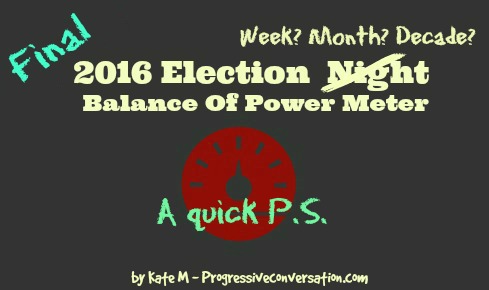

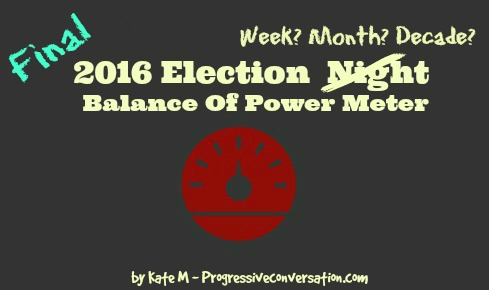


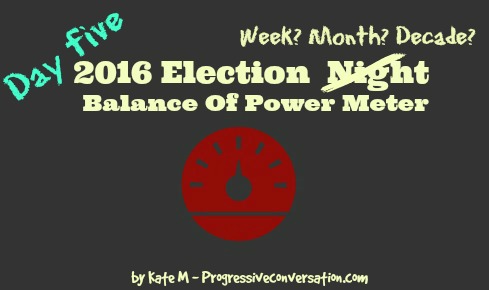
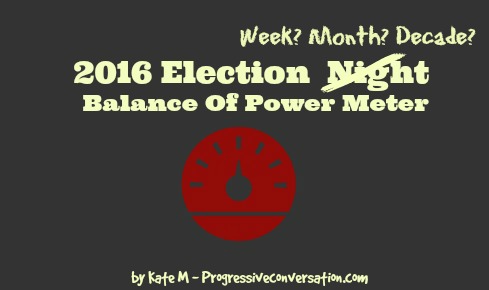

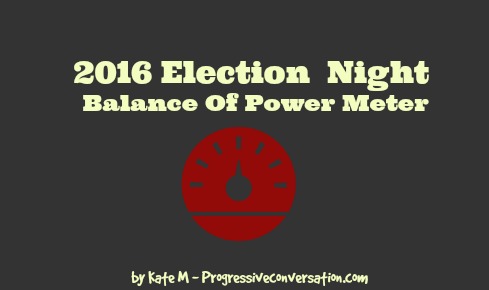

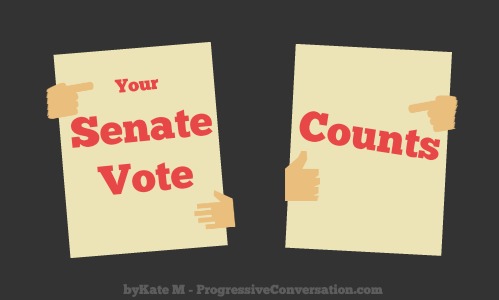


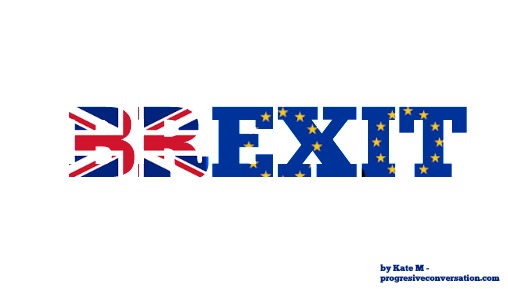



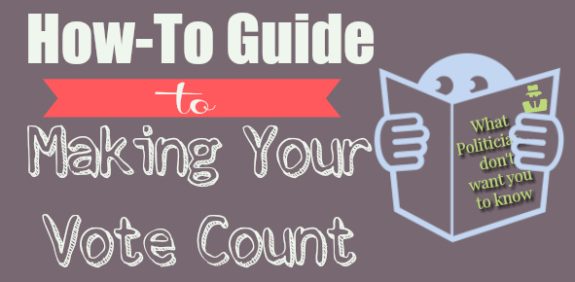

 Looking at the second preferences given by the 140 voters who listed Anne as their first preference – they were:
Looking at the second preferences given by the 140 voters who listed Anne as their first preference – they were: The first candidate to be eliminated from our simplified election is Frances – who only had 5 first preference votes. The second preferences given by the 5 voters who voted for Frances as their first preference are as follows:
The first candidate to be eliminated from our simplified election is Frances – who only had 5 first preference votes. The second preferences given by the 5 voters who voted for Frances as their first preference are as follows:



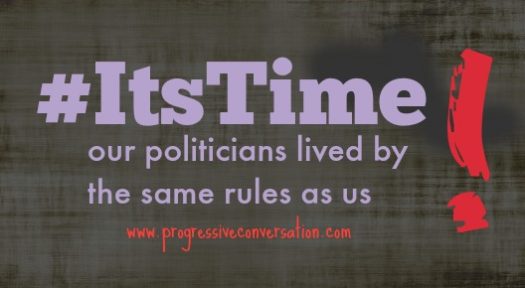

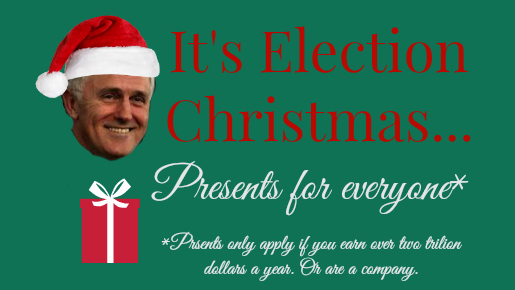

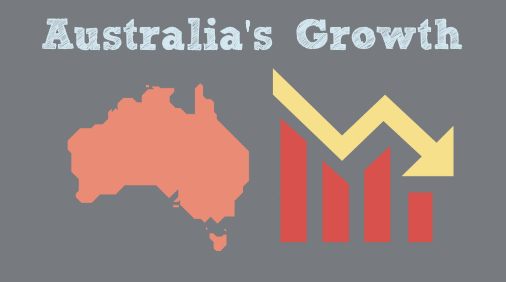

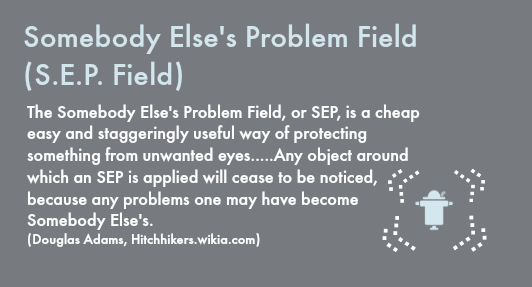
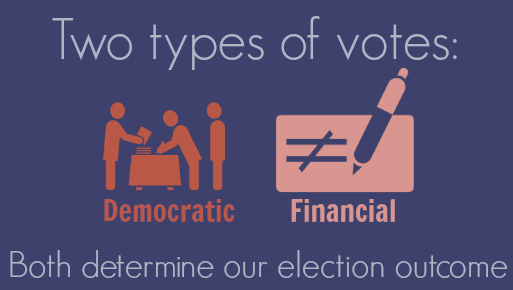
 Further, according to Labor, the Greens and many Independents, the ABCC legislation is in no fit state to be passed. Independent Senator Jacqui Lambie tweeted on Monday that the legislation was “
Further, according to Labor, the Greens and many Independents, the ABCC legislation is in no fit state to be passed. Independent Senator Jacqui Lambie tweeted on Monday that the legislation was “
